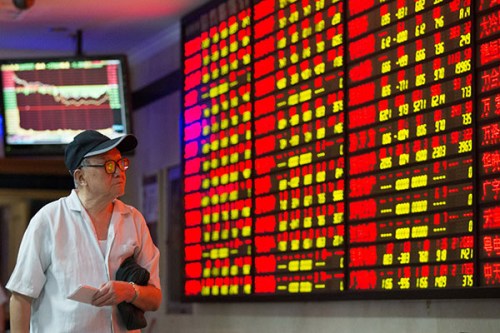

 |
| Rally by blue chips pushes index higher An investor studies a display giving stock market information at a brokerage house in Nanjing, Jiangsu province, on Monday. (Photo/China Daily) |
Wide-ranging series of support measures fails to stop small stocks tumbling further
Gains by large-cap and blue chip stocks stabilized the stock market on Monday after the government rolled out an unprecedented series of measures to halt a dramatic slide that has raised fears of a crash.
But the sharp divergence between large-and small-cap stocks could be a troubling sign and may complicate the government's rescue efforts, analysts warned.
Led by financial, energy and real estate shares, the benchmark Shanghai Composite Index rose 2.41 percent in volatile trading to close at 3,775.91 points.
The transaction value of exchange-traded funds that track the largest 50 stocks in Shanghai reached a record value of 24.9 billion yuan ($4.03 billion) as government-backed securities firms and fund managers poured cash into the market.
Futures contracts for the CSI 300, SSE 50 and CSI 500 indexes for July surged during afternoon trading, indicating improved market sentiment.
To curb speculative trading, the China Financial Futures Exchange limited on Monday the maximum daily turnover of stock index futures trading for the CSI 500 to 1,200 contracts per trading account.
While the rally of large stocks helped calm the panicky market's nerves, mid-and small-cap stocks as well as those listed on ChiNext, the country's startup board, continued to suffer heavy losses. The startup index fell 4.28 percent, and nearly 900 smaller stocks tumbled by the 10 percent drop limit.
"Whether the blue chips will calm the small caps, or the small caps will continue to unsettle the rest of the market, remains to be seen," Hong Hao, chief strategist at Bocom International Holdings, wrote in a research note.
"Buying anything expensive outside the blue chips will be tantamount to throwing good public money after bad and it should not be celebrated."
The ChiNext index traded at a record price-to-earnings ratio of 131 times last month. The gauge has lost more than 30 percent from its peak in mid-June.
Li Xunlei, chief economist of Haitong Securities, said the government's short-term priority is to ward off systemic financial risks by stabilizing the market, and this could lead to State funds being used to buy even the expensive smaller stocks to stem the market's decline.
"It is a dilemma for the government," he said. "But most systemic financial risks have been concentrated in the small stocks, as they are the most heavily invested equities by margin accounts. If the issue is not addressed, the market risks further decline."
On Monday, the National Council for Social Security Fund told mutual fund managers acting on its behalf that they can only increase their holdings, rather than selling any stocks owned by the pension fund.
In addition, a slew of mutual funds pledged to use their own capital, rather than investors' cash, to buy shares for their fund products that invest in the country's equities market. They promised to keep the holdings for at least a year.
Experts said the government is likely to do "whatever it takes" to support the equities market. The current sluggish economic conditions did not exist during the previous boom-and-bust stock cycle in 2007.
A crash of the equities market and the destruction of capital could have a much wider and more substantial impact on the economy, since the country is under pressure from industrial deflation and a sustained growth downtrend, they said.
 Evolution of Chinese beauties in a century
Evolution of Chinese beauties in a century Creative graduation caps of ‘vigorous elves’
Creative graduation caps of ‘vigorous elves’ Typhoon class strategic Submarine in photos
Typhoon class strategic Submarine in photos Hong Kong college students feel the charm of Hanfu
Hong Kong college students feel the charm of Hanfu Japan’s crimes committed against "comfort women"
Japan’s crimes committed against "comfort women" Odd news:“carrying a rod and asking to be spanked”
Odd news:“carrying a rod and asking to be spanked” Legendary life of a bee-keeping master in Hainan
Legendary life of a bee-keeping master in Hainan 4-year-old cute 'monk' spends summer holiday in temple
4-year-old cute 'monk' spends summer holiday in temple Hong Kong in lens
Hong Kong in lens Editorial: An uncertain road ahead for Greece and EU
Editorial: An uncertain road ahead for Greece and EU China’s class of 2015 gets creative with graduation photos
China’s class of 2015 gets creative with graduation photos Girl power on the pitch
Girl power on the pitch Giant panda Yuanzai turns two at Taipei Zoo
Giant panda Yuanzai turns two at Taipei ZooDay|Week